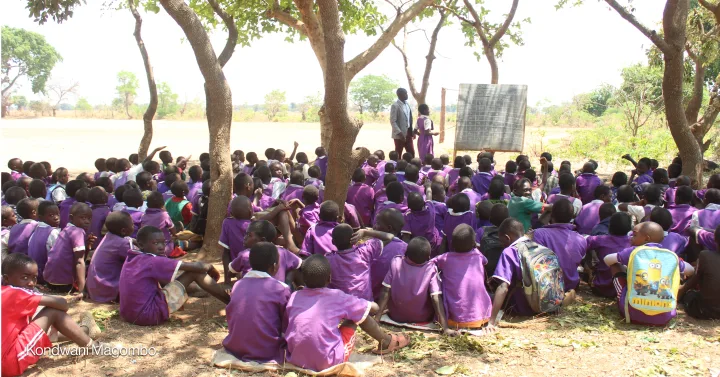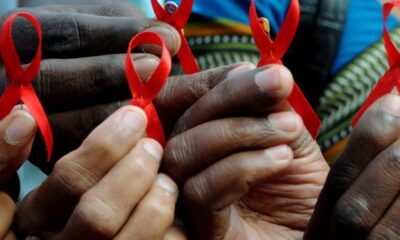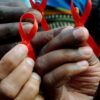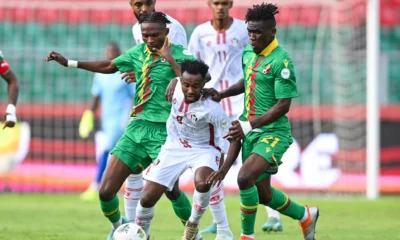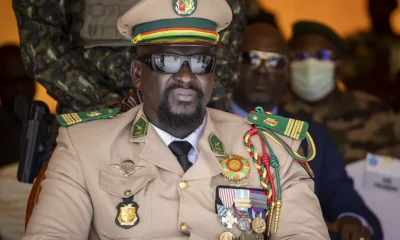Africa
How Africa’s Schools And Hospitals Are Paying The Price Of IMF Austerity
A silent crisis is eroding the foundations of public health care and education systems in Africa. The relentless grip of International Monetary Fund-driven austerity measures, which compel governments to slash expenditure on vital public services in favor of servicing foreign debt, is devastating the health care and education systems on the continent, according to a recent ActionAid report.
The report criticises IMF policies that force low-income countries to prioritise debt repayments over essential services in six African countries: Ethiopia, Ghana, Kenya, Liberia, Malawi, and Nigeria.
The IMF says these austerity measures, which include “social spending floors” — minimum government spending targets for education, health care, and social protection — are intended to help struggling countries stabilise their economies. However, the report finds these measures have still taken a heavy toll on public services.
According to the study, budget cuts have resulted in failing public education systems crippled by rising costs, a dire shortage of learning materials and overcrowded classrooms with 87% of teachers indicating they lacked basic classroom materials and 73% shelling out for equipment themselves.
In Malawi, some teachers manage more than 200 students without adequate resources, making it almost impossible to provide quality education. Four of the six countries covered by the research are spending less than the recommended one-fifth of the national budget on education and exceed the ratio of one teacher per 30 pupils, as reported by the UNESCO Institute for Statistics.
Furthermore, UNESCO indicates a sharp decline in international aid for education in low-income countries. New figures from UNESCO’s Global Education Monitoring report indicate that least-developed countries are currently facing an annual shortfall of $97 billion to achieve global education goals. The report further projects that aid to education will decrease by 25% by 2027.
Christian Aid estimates that 90% of school financing in Malawi comes from loans, with debt repayments consuming 43% of the country’s domestic revenue, severely constraining government spending on essential public services such as health and education. With health expenditure standing at just 7.41% of the country’s gross domestic product and education accounting for only 3.3%, hospitals frequently lack essential drugs, just as schools have overcrowded classrooms.
Kingsley Zefenia Makiyoni, Malawi country director at Christian Aid, said the country’s dependence on foreign aid has left it vulnerable to external shocks, with a sudden withdrawal of over $350 million in USAID funding, representing more than 13% of the national budget.
A report by Oxfam and Development Finance International found that 94% of African countries with World Bank and IMF loans have cut vital investments in education, health, and social protection. The report also noted that 79% of these countries have weakened their tax systems’ ability to reduce inequality, while labour rights and minimum wages have worsened in 89%.
“Austerity policies borrowed from a 1980s playbook have set us years back in the fight against inequality in nearly every African country. These disastrous and anti-development policies are pushing governments to make the torturous choice between investing in education and health or paying ballooning debt,” said Fati N’Zi-Hassane, director of Oxfam in Africa.
Benedicto Kondowe, executive director of Civil Society Education Coalition in Malawi, told Devex the IMF-driven austerity measures have constrained the fiscal space of low-income countries, limiting their ability to recruit teachers, expand school infrastructure, and invest in gender-responsive education programs.
“Malawi’s education system is grappling with chronic underfunding, high pupil-to-teacher ratios, inadequate infrastructure, and poor learning outcomes. The most pressing challenge is the mismatch between the growing school-age population and stagnant investment in school facilities and qualified personnel,” Kondowe said.
The toll on health
Health care workers in Nigeria are stretched beyond their limits, and communities’ fundamental rights to health care are severely impacted, according to the report. Andrew Mamedu, country director of ActionAid Nigeria, said the debt crisis and the IMF’s insistence on cuts to public services in favour of foreign debt repayments have severely hindered investments in health care and education across Africa. He said in 2024, Nigeria allocated only 4% of its national revenue to health, while a staggering 20.1% went toward repaying foreign debt.
“This is not only absurd but unsustainable in the long run. The time for change is now. Governments must shift from unsustainable economic policies based on cuts and debt repayments to those that prioritise human rights. The lives of millions depend on it,” he said.
While the research highlights how insufficient budgets in the health care system have led to chronic shortages and a decline in service quality, what is also clear is the disproportionate impact on women. Community members in all six countries revealed deep dissatisfaction with the public health care system and noted rising costs of services, shortage of health care workers, and poor infrastructure.
“In the past month, I have witnessed four women giving birth at home due to unaffordable hospital fees. The community is forced to seek vaccines and immunisation in private hospitals since they are not available in public hospitals. Our [local] health services are limited in terms of catering for pregnant and lactating women, as a result, most women must seek services in Mombasa, which is expensive,” said Maria, a public health worker from Kenya.
Furthermore, medicines for diseases such as malaria have become expensive at private facilities. Patients are often forced to travel long distances to public health centers, where staff shortages sometimes mean they receive no assistance.
Seeking solutions
Roos Saalbrink, global lead on economic justice at ActionAid International, said while the debt crisis and drive for austerity are amplified for countries in the global south and low-income countries, the burden of debt falls on those most marginalized.
“Governments must agree on new international rules on global economic governance that shift important decisions away from the IMF and towards democratic institutions, such as the United Nations, to shape a fair and inclusive global economy for all,” she said.
While civil society organisations and development experts are working to find solutions to the challenges, Kondowe said implementing progressive tax reforms can help increase government revenues and reduce inequality. He said ring-fencing education and health budgets, even under tight fiscal frameworks, is critical, adding that IMF programs should include social spending floors as binding commitments, not optional targets.
“Fiscal responsibility must not come at the cost of human capital development. Governments and development partners can reconcile these priorities by adopting progressive taxation, curbing illicit financial flows, and promoting debt restructuring where necessary. In the face of austerity, countries should negotiate policy space with the IMF to preserve social sector spending,” he said.
Kondowe suggested key policy reforms in education governance could include adopting a rights-based approach to education budgeting that protects minimum spending thresholds, integrating gender-responsive budgeting, decentralizing school governance to empower communities, and strengthening accountability mechanisms to track the efficient use of education funds.
Although IMF austerity measures have been widely criticized for potentially undermining human rights, the organization maintains they are necessary. Kristalina Georgieva, the IMF managing director, said addressing global debt vulnerabilities remains a priority for its members, especially for low‑income and vulnerable countries.
“They welcome the progress made in debt treatments under the G20 Common Framework. They also express their commitment to addressing global debt vulnerabilities in an effective, comprehensive, and systemic manner,” she said during the 2025 World Bank-IMF Spring Meetings.
She said members encouraged the IMF and the World Bank to help advance the implementation of the three‑pillar approach to address debt service pressures. The IMF’s 2024 and 2025 Low Income Reports indicate that while the economic outlook for the low-income countries is gradually improving, they continue to face persistent macroeconomic vulnerabilities, including liquidity challenges due to high debt service. The fund said that while 11 of the 20 fastest-growing countries in 2024 were LICs, many of the poorer and often also fragile and conflict-affected countries saw virtually no progress in per capita incomes over the past 15 years.
Meanwhile, as the global community convenes at the Fourth International Conference on Financing for Development in Sevilla, Spain, African civil society organizations that organized a tribunal on Africa’s debt cancellation last month in the Malawi capital Lilongwe are calling for a reform of the IMF and the World Bank which they claim have policies which favor the west.
Their debt justice proposals, mostly centred on debt cancellation, increased grants, and concessional financing, aim to provide low-income countries with the necessary support to tackle poverty effectively. According to Mulayi Muni, a communications officer at The Institute for Social Accountability, a civil society organisation in Kenya, the current global financial system is stacked against the world’s poorest people.
“We need a system that works for everyone, not just the wealthy few. FfD4 is a chance for the international community to get it right and ensure that the financing for the development agenda is people-centred and poverty-focused,” she said.
While the IMF austerity measures have stifled economic growth and increased inequality, the debate of debt cancellation is critically controversial because of financial management and corruption across the continent, said Innocent Chikopa, vice board chairperson at the Malawi Economic Justice Network.
“Borrowing must be tied to high-impact projects that benefit people and not just enrich the privileged few. Together we can forge a new path that prioritises economic justice, human rights and sustainable development,” he said.
Adopted from Devex News
Comments



